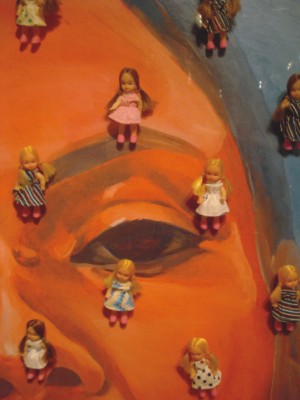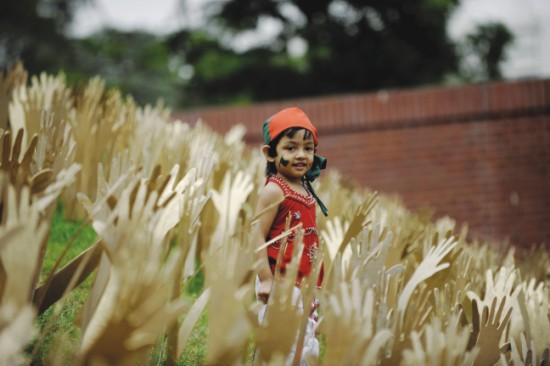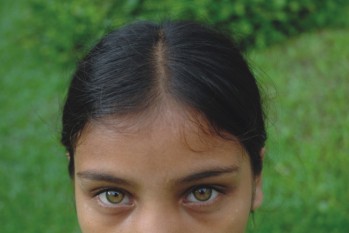
Inside
|
Things I Won't Tell My Daughter
When it comes to the issue of harassment or abuse, sadly most women have a story. Unfortunately, there is little that is unique in a narrative of humiliation and suffering; experiences with degradation, whether physical, verbal or emotional, invariably reflect a pattern of those in power taking advantage of those without, of those who are ingrained with the belief that they can, exploiting and manipulating those who are limited in their ability to
protect themselves. This forum is not for idealising the perfect victim and portraying the perfect perpetrator; neither is it for seeking personal catharsis. If either were the case, beyond capturing the attention of a few with some riveting stories, and possibly being dismissed by others who are bound to think that it has all been said before, this article would do little else. After all, the realities of women's second-class citizenship in Bangladesh in the spheres of education, law, economy, politics, religious practices, and cultural norms, in the public and the private realms, are constant reminders of the power dynamics still at play in society. Despite my hesitancy in writing a generic article about the biological and social constructions of the masculine and the feminine and the subsequent realities of power inequalities, my decision to write this piece is based on an attempt to reflect a little on the why it is that in the 21st century, more than fifty per cent of the country's population is impatiently pacing the platform, waiting for the train to equality. After all, one does not require a degree in women's and feminist studies to recognise that men and women are treated differently in society and by society; and that institutionalised practices of bad behaviour are cloaked in the guise of culture, religious practices, and social norms. It's a Global Problem We continue to live in a world where: of the 1.2 billion people living in poverty, 70% are women; 46% of the girls in the poorest countries have no access to primary education; while women work two-thirds of the world's working hours and produce half of the world's food, they earn only 10% of the world's income and own less than 1% of the world's property. While some countries do perform better than others in the gender empowerment index (GEM), gender inequity is more the norm than a deviation. From verbal abuse to sexual violence or homicide, sometimes it is more of a question of degrees in the continuum of ill-treatment rather than its complete absence that informs women's experiences. Bringing It Back Home Let's Respond And, unfortunately there are no indicators to measure domestic violence, verbal abuse and systematic corrosion of self-worth through consistent deprecation. Perhaps the question is far more basic -- an expectation that women will not be grabbed, prodded, fondled and ogled in public; that their bodies will not be owned, possessed, and abused by their spouses and partners; that they will not be subject to verbal, not just physical, abuse in their homes and in public spaces; that their marital status not be the subject of a tea-party discussion and be the reason why they are denied access to living accommodations; they will not be burnt with acid and/or gang raped because they dared say no to advances, are guilty of flirtatious behaviour, or for the transgressions of a family member; that their character will not be called into question and they will not be asked for sexual favours by friends and colleagues; that to intimidate the minority population, goons will not rape and abuse young women and girls for a few ballots; that the military, police and local militias will not use sexual violence to invoke fear among the indigenous population; that irrespective of age and personal connection, a woman's worth will be evaluated in a professional setting based on her credentials and personality, not on the size of her mammary glands. Is That Too Much To Ask? Admitting underlying gender biases society continues to hold and that is manifest in the law, economy and cultural practices does not take away the thunder of women's achievements. It is indeed a credit to the women of Bangladesh that despite unequal treatment at home and in public, that despite religious and cultural practices that undermine women's equal access to property, child custody and inheritance, women (and many men) have continued to push the boundaries of socialised intolerance. Defensiveness does a disservice to the realities that women face in our country even today by turning a blind eye to the humiliation that comes with inequality; defeated admittance to the fact we cannot fare any better undermines both the potential and the possibilities of the simple truth that men and women can and should do better. It is the only way towards change. This brings us to the third response. Admittedly, change takes time, and yes, youth and impatience are synonymous. Change is happening in Bangladesh and is challenging many previously socially held norms and cultural dictates. But are all changes progressive? Lest we become complicit, for every step that is taken towards women's emancipation, there is also a counter current of regression. Violence against women has not depreciated over the years despite the numbers of organisations that are working to promote women's rights and the increasing numbers of women have a keen sense of awareness about their rights. The hungry eyes that followed my mother in her youth still take every opportunity to leer at me decades later. The reality of women carrying a disproportionate share of responsibility in the event of sexual abuse and harassment still persists; the actors in the discussions and the settings might have changed, but the finger-pointing and the moral judgement placed on the character of the woman precedes the moral condemnation of the crime. Anyone thinking that this is an argument about what women should wear, wherever they want, here is a sombre reminder: for the vast majority of Bangladeshi women who are molested, abused, raped, and denied equal rights in the courts of law, the fantasy of wearing short skirts and partying in the rich areas of town are a far cry from reality. We must not ignore the "real" realities of Bangladesh that have little to do with what one wears, and more to do with what the society gives some men license to do: the sexual and physical abuse and murder of under-aged domestic servants; sexual abuse of minors by members of their own family; the rape of the little flower girls so visible on the Dhaka streets; selling fourteen-year-olds into prostitution rings; the denial of a mother's right to have custodial rights over her son; marital rape and domestic abuse not just by partners but also by in-laws; the list is brutal and endless.
Personal Reflections I find it odd that in the 21st century, in a world facing so many challenges, we still find time to contemplate the politics of the hijab and bestow virtues on those who wear it and secretly condemn those who do not. I find it schizophrenic that while the current trend in society is toward gaining an educated and accomplished daughter-in-law as a crowning glory, the standards by which the same family judges their son-in-law and daughter-in-law are vastly different. I find it intolerable that as mothers, sisters, friends, and colleagues, we perpetuate our own biases and continue to entrench practices that place a higher premium on the brother, husband, son -- whom we are more willing to forgive and make excuses for than the women we know. I find it shameful that, even in educated circles, we reward bad behaviour by unequal distribution of responsibility when it comes to issues of abuse, cheating, or ill treatment. I find it unacceptable that seemingly educated and progressive-minded women continue to find new ways to consolidate the status quo and impose barriers on their own potential I find it offensive that a young professional woman will not be treated with the same level of respect as her male counterpart in a circle of educated peers; that while he is coveted for his acumen, she is expected to play the role of a decorative wallflower; that while he is respected for his judgement, she can be at the most indulged with a patronising smile. I resent the fact that despite all the changes that have swept over Bangladesh, a father and husband's name carries more worth than a woman's own merit. I find it sad that unless rich women of established families get abused or molested, and unless people like myself write in English to condemn our complicity in questionable social practices, we continue to accept the daily abuse and harassment of the poor and the unprotected in our own cities. If respect could have only been achieved with education, the world would have long done away with gender inequality at the societal, cultural, and institutional levels. If security and reverence could be achieved either through the burqa and the hijab, women in Afghanistan would not be seeking out self-immolation as the means of escape from domestic and public abuse and the lines for female immigration to countries like Afghanistan and Saudi Arabia would put the queues outside of the US embassy to shame. If America is idealised by young women who question practices of female indignity in Bangladesh, let's note that every six minutes, a woman is raped and every fifteen seconds a woman is battered and in the United States, where spousal/partner abuse is the leading cause of death amongst pregnant women. In a vast majority of these cases, the image of "short skirts" and "skimpy" outfits that "invite" trouble, as some of us would like to believe, is truly an illusion.
In the real world, women are neither saints nor saviours. They are peacemakers and war-mongers, victims and perpetrators, witnesses and collaborators, rapists and healers, murderers and doctors; educators, criminals, mothers, thieves, somebodies, and nobodies. Valorising women or demeaning them is an exercise in societal control, creating little opportunity for human fallibilities and strengths. The important thing we forget in the process of socialisation is that women are humans, and, as such, beyond their societal roles, they are fundamental living, breathing, feeling individuals locked in a battle of a pre-destined status quo that requires them to be less, so that in general, men feel they are more. And while the dance of the sexes is fascinating, complex, and ever-evolving, the grim manifestations of power and its access make the two sides unequal partners. From Azerbaijan to Afghanistan, Gaza to Jerusalem, Morocco to Bangladesh, from the United States to Central America, from border controls to cultural gatherings, official meetings, to television settings, from mosques to temples, from the public to the private realms, as a woman, I am no stranger to harassment. It's not even amusing anymore. Frankly speaking, I am bored. I am bored by perceived notions of male superiority, however they are explained. And I am floored by the absurdity of how we continue to buy into practices, norms, and beliefs that undermine our very potential and possibilities as human beings. I recognise when a society tries to define the boundaries of the "masculine" and the "feminine" what it actually does is define limits and potentials and control the politics of reproduction. When a woman is fondled or ogled, the message is simple: first, you do not belong; second, "I am doing this, because I can." Both stem from a sense of entitlement, an entitlement we have institutionalised, enforced, and reinforced in every single of our private and public interactions. And each day, millions across the globe pay the price. If I have a daughter, I wonder if I can ever look her in the face and tell her she needs to stand at the back of the line to pray so that men are not distracted by her posterior as they worship their God; that she might have to break her fast during iftar after the men have been served; that she should focus on preening herself instead of getting dirty in the mud playing football so that Prince Charming doesn't miss the opportunity of rescuing her; that she needs to accept the reality that some male friends and colleagues will ask her for "special" favours because they think they can get away with it; that if her partner verbally abuses her, but does not hit her, she should accept it, because it's not a big deal that her self-worth is eroded over time; that she believes she cannot do or be something that her potential dictates because women around her tell her she cannot; that she needs to be a little less of herself so that her partner can feel he is just a little bit more, that a man will always try to take advantage of her, simply because he can; that she may lose her children in a divorce if the court wills because that's the law; that although she may be ready to take on the world, the world may not be ready for her. Somehow, I don't think I will. Tazreena Sajjad is the author of Women Guerillas: Marching Toward True Freedom? (2004) and Post-Genocidal Trauma and its Impact on Women (2009). |


